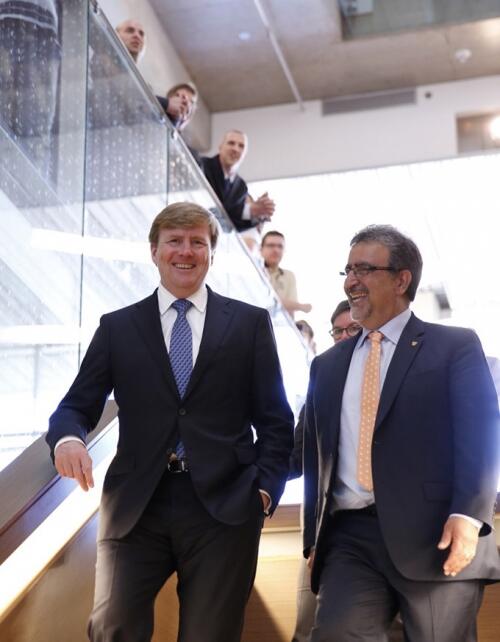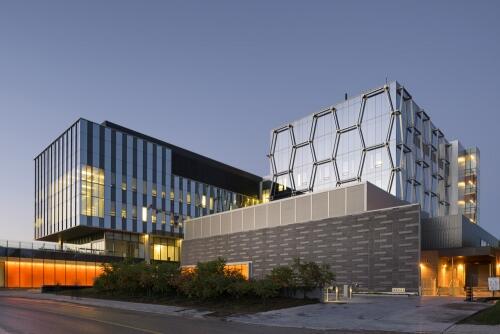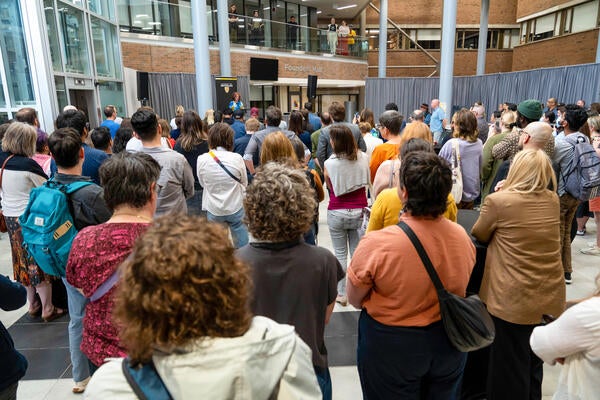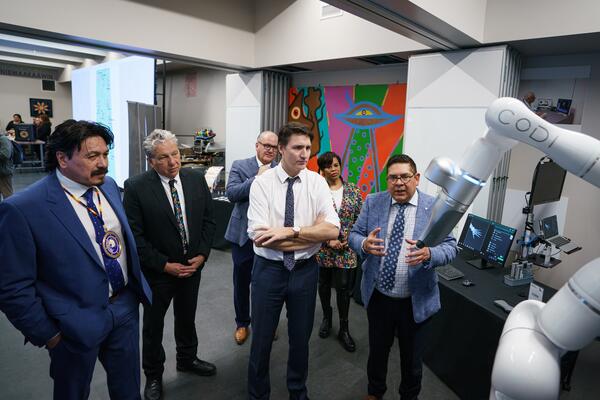The Dutch king and queen visited the University of Waterloo today and witnessed two of the world’s leading innovation universities announcing a new research and education collaboration that aims to advance the field of quantum computing.

Their Majesties King Willem-Alexander and Queen Máxima of the Netherlands witness the signing of a memorandum of understanding between the University of Waterloo and Delft University of Technology during the couple's state visit to Canada on May 28, 2015. (Credit: Jonathan Bielaski/Light Imaging/University of Waterloo)
The University of Waterloo in Canada and Delft University of Technology in the Netherlands signed a new memorandum of understanding that allows exchange opportunities for students, staff and researchers, collaboration on research projects and the exchange of research publications and reports in quantum information.
“These are two universities leading the world in innovation,” said Feridun Hamdullahpur, president and vice-chancellor of the University of Waterloo. “This new agreement positions both Waterloo and Delft to accelerate progress quantum information research while exposing our students and research to diverse experiences that will position them to lead the new world economy.”
Feridun Hamdullahpur and Anka Mulder, vice-president for education and operations at Delft, signed the memorandum in the presence of Their Majesties King Willem-Alexander and Queen Máxima of the Netherlands during part of an official state visit to Canada.
As part of the visit to Waterloo, the royal couple also toured a quantum optics laboratory in the Mike & Ophelia Lazaridis Quantum-Nano Centre. The laboratory lead by Professor Kevin Resch a Canada Research Chair in Optical Quantum Technologies from Waterloo’s Institute for Quantum Computing (IQC) and Department of Physics and Astronomy, features experiments that use light for quantum communication and computing.
Waterloo’s IQC and Delft’s QuTech are among the top quantum research institutes in the world and both universities are committed to creating the worlds first 100-qubit quantum computer. Raymond Laflamme, executive director of the Institute for Quantum Computing at Waterloo, holds the current world record for the largest number of controlled quantum bits manipulated using universal control, at 12 qubits. A 100-qubit computer would establish the baseline for all future quantum systems and experts expect to reach the target within the next five years.

His Majesty King Willem-Alexander and University of Waterloo president Feridun Hamdullahpur in the Mike & Ophelia Lazaridis Quantum-Nano Centre during the couple's state visit to Canada on May 28, 2015. (Credit: Jonathan Bielaski/Light Imaging/University of Waterloo)
“We are extremely fortunate here in Waterloo that the governments of Canada and Ontario have made significant strategic investments in quantum information research,” said Professor Laflamme. “Delft’s QuTech also enjoys very strong support from the government in the Netherlands and I am confident that our collaboration on quantum information research will ensure that these investments position our nations as leaders in the quantum race.”
The king and queen were joined in Waterloo by Bert Koenders, Dutch Minister of Foreign Affairs, Jet Bussemaker, Dutch Minister of Education, Culture and Science, and more than 20 Dutch higher education institutions solidify the ties between Canada and the Netherlands and share best practices in higher education.
The visit also marked the launch of the Liberation Scholarship Program. The historic scholarship celebrates the 70th anniversary of the liberation of the Netherlands by Canadian forces at the end of the Second World War. Madeline Liddy, a masters student from IQC, was among the first five recipients awarded the scholarship.

Shared by the Institute for Quantum Computing (IQC) and the Waterloo Institute for Nanotechnology (WIN), the Mike & Ophelia Lazaridis Quantum-Nano Centre provides our researchers with the tools and opportunities they need to unlock the amazing power of quantum information science and the boundless potential of nanotechnology. (Credit: doublespace photography)
IQC Background
- IQC is among the top five quantum research institutes worldwide. Established in 2002 by the University of Waterloo, with the support of Mike and Ophelia Lazaridis and the governments of Canada and Ontario, IQC is driving the realization of quantum technologies with over $350 million invested into key faculty, infrastructure and programming.
- IQC is at the heart of the Quantum Valley. Mike Lazaridis and Doug Fregin, IQC benefactors, announced the creation of Quantum Valley Investments in 2013, an investment fund worth $100 million to invest in quantum spin-off companies.
- IQC research bridges theory and experiments in quantum computing, quantum communication, quantum sensors and quantum materials through the collaboration of more than 200 computer scientists, engineers, mathematicians, physical scientists and students.
- In 2012, Waterloo opened the Mike & Ophelia Lazaridis Quantum-Nano Centre, a building designed with the highest level of scientific research in mind and home to IQC and the Waterloo Institute for Nanotechnology.
- IQC recently attracted Raffi Budakian, renowned physicist from University of Illinois at Urbana-Champaign and faculty member Michael Reimer from Delft to increase its faculty complement to 25. IQC continues to grow towards its target of 33 faculty, 55 postdoctoral fellows and 165 graduate students.
Recent IQC research achievements











